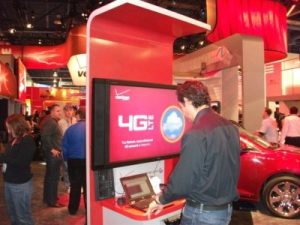Say goodbye to Verizon tethering fees
 Sometimes, even the worst storm cloud has a silver lining.
Sometimes, even the worst storm cloud has a silver lining.
Today, Verizon Wireless entered into a settlement with the US Federal Communications Commission that lifts the carrier's prohibition on free tethering apps. Verizon had blocked customers from using such apps -- there are plenty on Google Play for Androids -- without paying an extra $20 a month more for the privilege. As such, smartphone users now have a new reason to choose Verizon over AT&T, Sprint or T-Mobile, which aren't subject to the same rules. If you're a Verizon customer or soon to be one, the consent decree is a kind of Christmas in July present. You can tether for free.
In purchasing 700MHz C-block spectrum for its 4G LTE network, Verizon agreed to certain limitations in the spirit of open access. FCC Chairman Julius Genachowski explains:
Today’s action demonstrates that compliance with FCC obligations is not optional. The open device and application obligations were core conditions when Verizon purchased the C-block spectrum. The massive innovation and investment fueled by the Internet have been driven by consumer choice in both devices and applications. The steps taken today will not only protect consumer choice, but defend certainty for innovators to continue to deliver new services and apps without fear of being blocked.
Licensing terms demand that licensees "shall not deny, limit, or restrict the ability of their customers to use the devices and applications of their choice on the licensee’s C-block network".
As part of the settlement, Verizon pays a $1.25 million payment -- parlance for "fine" -- and allows the sale and use of tethering apps. So Android users can now turn their phones into mobile hotspots or tether for free. However, there's a back door that Verizon might find hard to enforce. The carrier can still charge for unlimited data plans, which are now standard with introduction of shared data plans introduced last month.
"This case was the first of its kind in enforcing the pro-consumer open access obligations of the C Block rules", P. Michele Ellison, FCC enforcement bureau chief, says. "It underscores the agency’s commitment to guarantee consumers the benefits of an open wireless broadband platform by providing greater consumer choice and fostering innovation"
Don't expect that enforcement to extend to other major carriers, if you're a customer looking for tethering relief. The open device rules aren't binding on the likes of AT&T, which operate high-speed services at different frequencies.
The consent decree comes as Verizon accelerates 4G LTE deployments that far outreach next-largest rival AT&T. On July 19, Verizon expanded high-speed service to 33 cities: El Dorado/Magnolia and Russellville, Ark.; New London County, Conn.; Fort Pierce and Melbourne/Titusville, Fla.; Columbus and Rome, Ga.; Burley, Idaho; Mattoon, Ill.; Anderson and Muncie, Ind.; Manhattan/Junction City and McPherson, Kan.; Lafayette/New Iberia, La.; St. Joseph, Mo.; Bozeman/Livingston, Kalispell and Missoula, Mont.; Goldsboro/Kinston, Roanoke Rapids and Rocky Mount/Wilson, N.C.; Zanesville, Ohio; Meadville and Punxsutawney/DuBois/Clearfield, Pa.; Orangeburg, S.C.; Sherman/Denison, Texas; Cedar City and Logan, Utah; Rutland/Bennington, Vt.; Lynchburg and Winchester, Va.; Bellingham, Wash.; and Beckley, W.Va. LTE is now available in 337 US markets, with Verizon targeting 400 by the end of the year.
